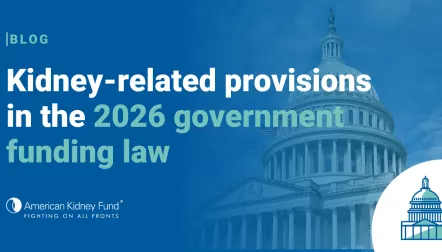
Press release
American Kidney Fund Applauds Introduction of California Living Organ Donor Reimbursement Act
ROCKVILLE, Md. (Feb. 16, 2022) — The American Kidney Fund (AKF) strongly supports the introduction of the Living Organ Donor Reimbursement Act (AB 2504) in the California State Assembly. The Living Organ Donor Reimbursement Act is a groundbreaking piece of legislation that would provide direct reimbursements of up to $10,000 to living organ donors for expenses associated with organ donation not covered by insurance. The bill would be the first of its kind enacted in the nation and would greatly remove financial barriers that currently prevent potential living organ donors from making their lifesaving gift.
AKF has been working closely with the bill's sponsor, Assemblymember Ash Kalra (District 27), to craft this legislation and introduce it in the State Assembly. According to AKF's Living Donor Protection Report Card, 20 states currently reimburse living donors through tax credits or deductions, which help to remove financial barriers but are not nearly as inclusive as direct reimbursements. If this bill is enacted, California would be the first state to provide direct reimbursements to donors after surgery through the establishment of a Living Organ Donor Reimbursement Program in the State Department of Health Care Services.
"California's Living Organ Donor Reimbursement Act would set a nationwide precedent for removing the financial barriers living organ donors face as a result of their altruism," said LaVarne A. Burton, AKF President and CEO. "AKF is grateful to Asm. Kalra for working with us on this bill and his commitment to saving Californians' lives through living organ donation. We encourage the California State Assembly to pass this bill quickly and ask that Gov. Newsom sign it when it reaches his desk."
Tax reimbursement laws in other states require living organ donors to file a tax return and itemize their deductions, which the majority of taxpayers do not do. Tax credits can be a useful mechanism for those who do itemize their deductions, but direct reimbursements of allowable expenses would benefit every Californian, regardless of tax return filing status.
When a living donor donates an organ, the recipient's health insurance typically pays for all of the living donor's medical costs associated with the transplant surgery. Out-of-pocket expenses, such as travel, lodging, childcare and prescription medications that may be needed during recovery are not necessarily covered, leaving the donor with a significant financial burden that could dissuade them from donating an organ. Removing such barriers to living donation is sound public policy that would increase the supply of much needed organs and save the lives of Californians on the organ transplant waiting list.
"With over 23,000 Californians waiting for a life-saving organ transplant, AB 2504 is a timely measure that will encourage organ donations by removing financial burdens associated with donating," said Assemblymember Kalra. "We can help save countless lives by offering this vital support to those that selflessly become living organ donors."
AKF's Report Card measures seven types of legislation states should enact to provide protections for living organ donors and encourage living donations. In the absence of federal legislation to protect living donors, there is an uneven patchwork of protections across the nation, with some states providing no protections at all. With three protections currently in place, California has a B grade on the Report Card; the overall grade average for the United States is a D. California does not offer tax credits or tax deductions for living organ donors.
While most transplanted organs are from deceased donors, patients may also receive organs from living donors. Transplants from living donors generally have fewer complications than deceased donor transplants and a longer survival of the donor organ.
There are more than 106,000 Americans on the organ transplant waiting list and over 92,000 of them (87%) are waiting for a kidney. Of the 25,489 kidney transplants performed in the U.S. in 2021, just 5,970 (23%) were made possible by living organ donors. In California, just 609 of 2,777 (22%) kidney transplants performed in 2021 were from living donors.
AKF provides long-term financial assistance that makes transplants and post-transplant care possible for low-income dialysis patients. In 2021, AKF grants helped 1,889 people nationwide receive kidney transplants — 7% of all kidney transplants performed in the United States. AKF's program helps post-transplant patients for their full insurance plan year, ensuring continuity of care.
About the American Kidney Fund
The American Kidney Fund (AKF) fights kidney disease on all fronts as the nonprofit with the greatest direct impact on people with kidney disease. AKF works on behalf of the 1 in 7 American adults living with kidney disease, and the millions more at risk, with an unmatched scope of programs that support people wherever they are in their fight against kidney disease—from prevention through post-transplant living. AKF fights for kidney health for all through programs that address early detection, disease management, financial assistance, clinical research, innovation and advocacy. AKF is one of the nation’s top-rated nonprofits, investing 96 cents of every donated dollar in programs, and it has received 24 consecutive 4-star ratings from Charity Navigator as well as the Platinum Seal of Transparency from Candid, formerly known as GuideStar.
For more information, please visit KidneyFund.org, or connect with AKF on Facebook, Bluesky, X, Instagram and LinkedIn.





